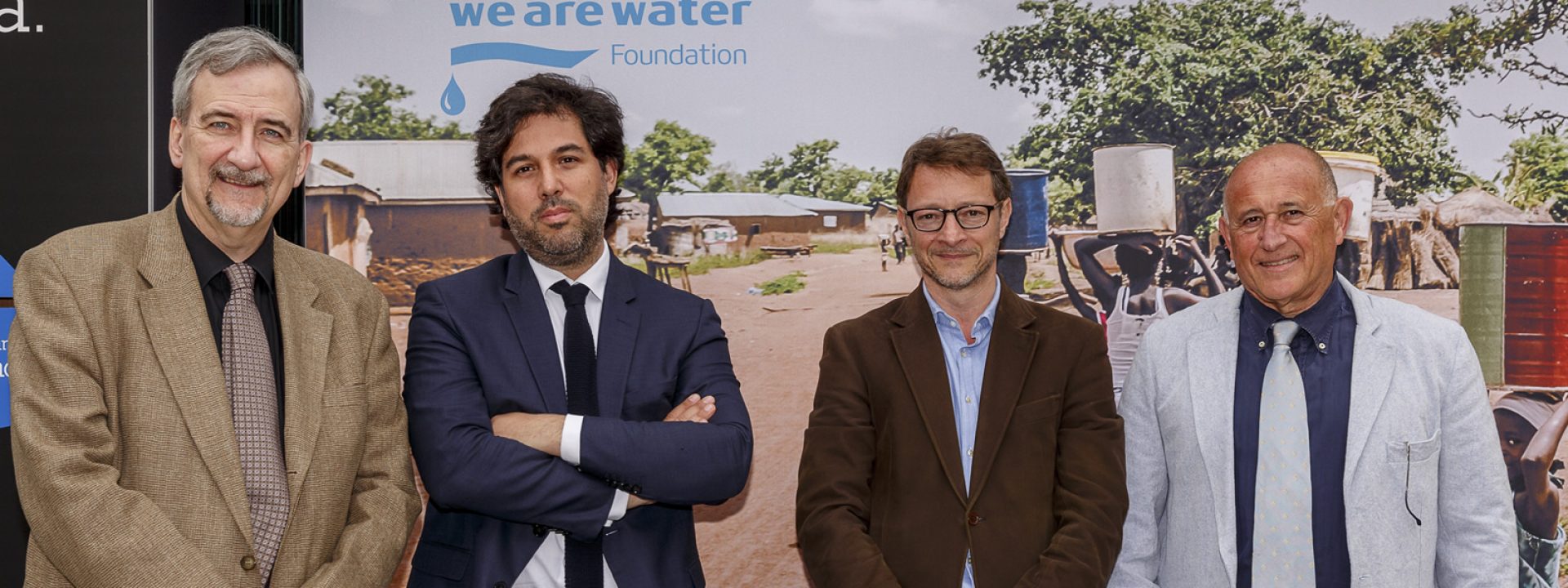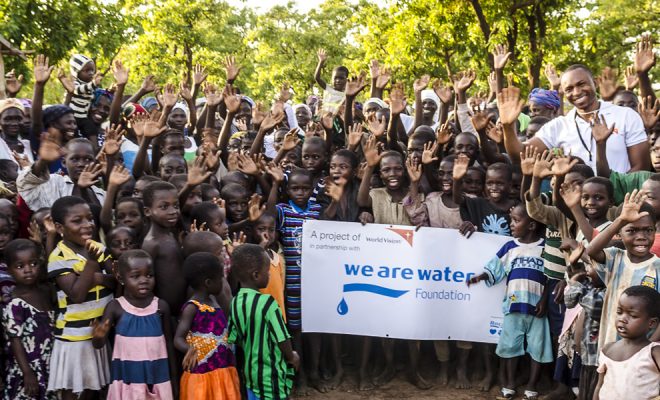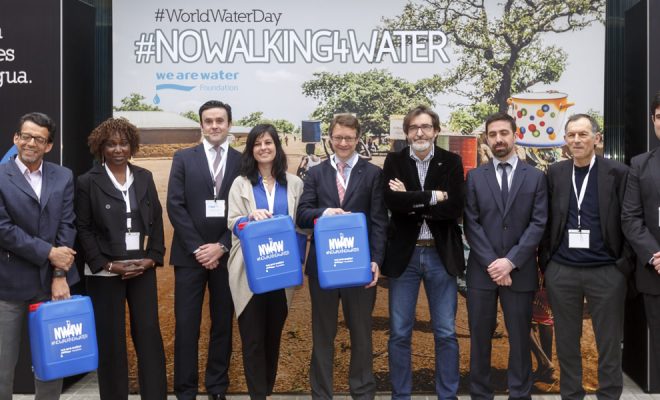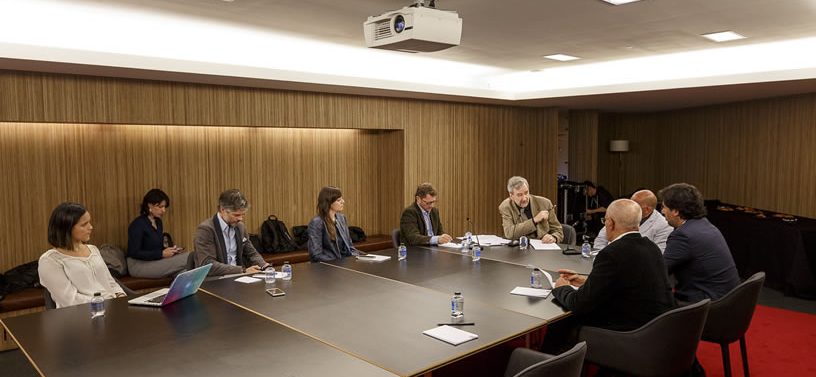
As in every World Water Day, the We Are Water Foundation organises a debate with experts on the theme chosen by UN. This year´s slogan, Why waste water? addressed one of the key global challenges of the water cycle: waste water.
The following speakers gathered at the Roca Barcelona Gallery: Juan Mateo Horrach Torrens, associate professor at the Universitat de les Illes Balears (University of the Balearic Islands), director of T.C.V. S.L. and industrial engineer on leave of absence of the Consell de Mallorca (Council of Mallorca); Gonzalo Delacámara, coordinator of the Department of Economic and Institutional Analysis of Water at IMDEA Water Foundation, academic director of the Water Forum and international consultant for UN, EU, OECD and international development banks; Xavier Torras, director of the We Are Water Foundation; and Santi Serrat, editor of the We Are Water Foundation. The journalist Pedro Pablo García May, assistant director of EFE Verde, moderated the event.
The scope and complexity of the water treatment problem was exposed in this debate. We face a challenge with different interpretations based on the communities involved. In the industrialised world it is a political and management challenge, and it can transform the socioeconomic model making it capable of bearing the menace of climate change and generating wealth while protecting the environment; in the depressed world due to the lack of access to water and sanitation, waste water is lethal and brings to light a vertiginous global problem. The experts are optimistic as they have confidence in the transformative power of the sensitized individuals.

©UN/Martine Perret
We need to explain the entire story
The problem of the waste of water goes beyond water as a residue and should take into account the entire cycle: for instance, 20% of the water in the Spanish supply system is lost due to the poor condition of the pipes or to mismanagement. The waste starts therefore well before water becomes a residue, as explained by Gonzalo Delacámara “citizens only understand what happens when water flows out of the tap and into the drain, they do not know anything of what happens before and after that. This distorts the discussions on supplied water, urban cycle and sanitation.” Delacámara insisted on informing users adequately about the real challenges: “the water safety challenge is essential. We need to be able to think that the supply is guaranteed by law, but we need to take into account that most of the important things that happen to water happen out of the water, and that the water policy lacks the capacity to solve problems such as the massive influx of tourists, urban, agricultural, industrial development, etc. We need to advance towards a coordination of sectorial policies. We make a mistake when we consider the water problem as a strictly environmental or sectorial problem: it is a cross-curricular problem.”
Juan Mateo Horrach supported the idea of acquiring a global vision when informing about waste water and he mentioned circular economy as an example of integration: “We need to convince ourselves that water treatment is just another step in the water cycle and that we need to contemplate its integral management. We cannot consider waste water as something isolated, managed by different people, everything is part of the same cycle. In this sense, the reuse of water is a model example of circular economy: to restore water to the environment so that it may be reused for human consumption.”
The experts highlighted the importance of public awareness in reference to the complexity and vulnerability of the water cycle. Xavier Torras highlighted that the population always reacts positively when it is well informed: “We need to make an effort and provide a communication based on self-awareness, not on prohibitions: people need to integrate all actions to take care of water in their lifestyles,” he commented and mentioned the example of the reaction of the population of Barcelona to the water crisis a few years ago: “Consumption decreased to 116 litres per person and day, a figure that is very close to the minimum amount established by the WHO, around 100 litres per person and day.”
For his part, Santi Serrat highlighted the enormous difference existing between the problems generated by waste water around the world depending on the level of socioeconomic development. “In the industrialised world, waste water creates a management problem with socioeconomic and environmental consequences; in the poorest countries, waste water is lethal, generating disgraceful situations and becoming a hindrance for economic development. No one dies due to waste water in Madrid or Barcelona, cities in which the worst situation cannot be compared to the shacks in New Delhi, Lagos or Manila, for instance.”
Management, the pending issue
At this point the debate fully addressed the water management problem, a key issue globally, but with a special importance in Spain due to the serious deficiencies that were brought to light by the participants in the debate.
Juan Mateo Horrach brought up the example of the island of Ibiza and pointed out that there is no technological problem in Spain; the problem can be found in the management of the water cycle: ”In Ibiza, an island with a good brand image, the rental of a hammock in some hotels can cost more than 100 euros in summer and there are water restrictions, with a desalination plant that has not been in use for more than 10 years, another one that does not function properly and a third one that has not had power availability for more than 20 years. There is a project to build a supply ring in the entire island which was drafted 15 years ago but has not been implemented. There is no technological problem, there is a mismanagement problem.”
The governance problems in Spain can be seen in the helplessness suffered by most small towns due to a confusing legal, financial and competence framework. Horrach pointed out: “Small towns are clearly neglected. Water is public by definition and the controversy based on public or private management has been concocted. Small towns do not have management capacity and if you take away the companies that provide the service they will not be able to manage themselves efficiently. This is not an ideological question, it is a fact.”
Gonzalo Delacámara highlighted the need to create efficient supramunicipal structures and avoid extreme regulations that end up being stagnating: “Everywhere, water management is the management of conflicts, of risk, and we need to study which part we pass on to citizens as prices or taxes, which part is passed on to the private sector and which part to the civil society and the financial sector. In Spain, a country with over 8.000 towns and over 2.500 small operators, which are unable to provide an efficient, equitable and profitable response, there is a fragmentation that creates serious difficulties. In no way do I think that the solution is to withdraw the municipal ownership, but to look for supramunicipal structures. There is no such regulating body in Spain, and therefore regulation is applied ad hoc to each contract. This leads to an overload of regulations that does not work, as it does not provide flexible and efficient solutions.”
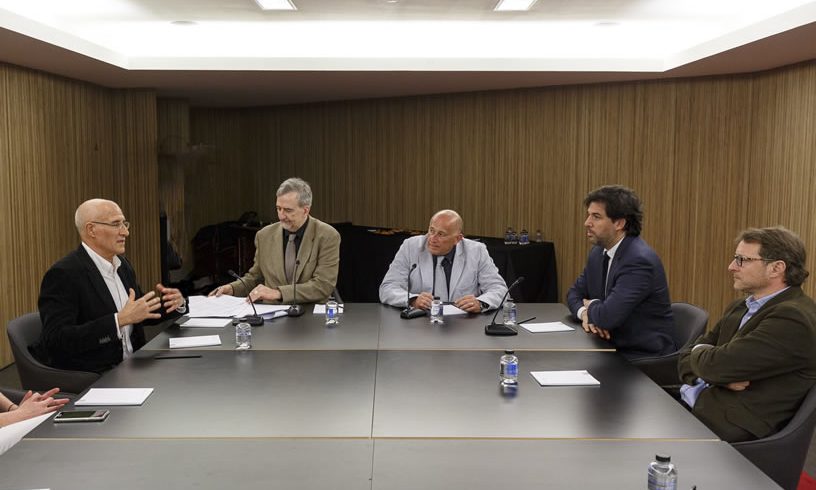
Reuse, the inevitable goal
In all countries threatened by climate change, recycled water could reload the aquifers and provide a solution to the problems of shortage. In fact, climate change threatens each and every one of the factors included in the water cycle, and for this reason, according to Delacámara, it could make a global positioning possible: “The water challenge is essential for the economic and social development in semiarid countries. If you are in Finland you can afford to make a mistake, but in Spain, Australia or Chile, if you make a mistake with water, the entire socioeconomic model collapses. It is essential to really focus on what is important and something that would help to do so is the need to adapt to climate change. Climate change does not add too many new problems; above all, it emphasises the existing ones: the already existing droughts will be more serious, the same will happen to flooding… and this is the case of Spain. The reuse of water should be a key goal.”
Horrach compared the water reuse process with the desalination process: “The desalination plants consume over 4 kw per m3 of water, and if we wish to reduce the consumption and the environmental impact it is an unacceptable solution and we would need to revert to solar energy to reduce the impact: if we reuse, the consumption is of 1 kw per m3, and we are therefore saving 70% of the energy.”
The issue of the reuse of water takes us to the need to develop advanced treatments to be applied to the elimination of emergent pollutants that continuously appear. Gonzalo Delacámara regretted the delay Spain experiences in this matter: “Only one third of the waste water receives an advanced treatment and in Spain we have state-of-the-art technology and for instance, Catalonia could be a European leader. But we have treatment plants that in the best-case scenario only operate with organic waste; we need to be able to go forward in the advanced treatment of emerging pollutants in order to be able to return water to the aquifers.”
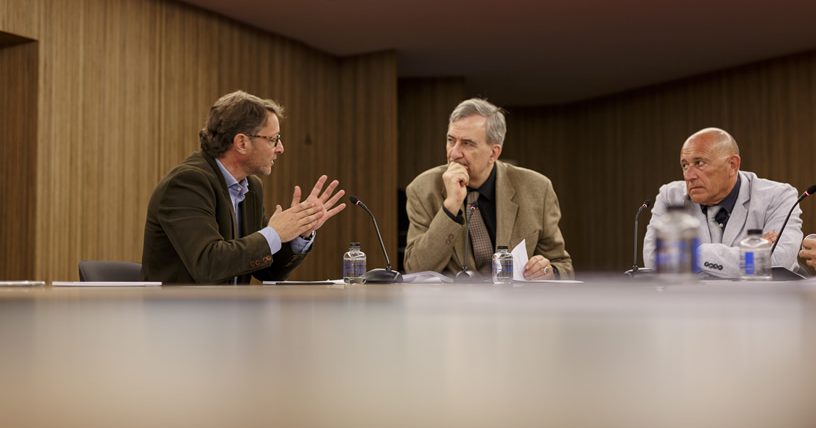
Citizen pressure and global awareness
The debate insisted again on public awareness as a key factor to achieve the reaction of the institutions to the problem of management efficiency.
Xavier Torras highlighted the need to develop social pressure in order to achieve changes: “We need to push politicians. We will not move without social pressure and for this reason it is necessary to communicate these problems even more. In the end, the reaction of the people will be positive in this sense, I am sure of it.”
Delacámara added that this communication needs to “avoid mythical ideas about water” and has to inform efficiently of the entire process, taking into account that problems arise from human decisions, as happens for instance in severe flooding: “Why are there homes in riverbeds? Why do we settle on the alluvial plains if they are bound to be flooded..? These are all erroneous human decisions.”
Serrat highlighted that the problem of waste water acquires a different dimension in the poorest areas, where it is necessary to inform well about the cultural singularities to avoid the transmission of clichés and to take into account the defencelessness of many communities when exercising their rights, as in numerous occasions their problems are invisible: “There are alterations in the censuses of affected people and therefore many people do not exist for the administrations. There is also an invisibility of figures that distorts the real effectiveness of solutions: sometimes a water fountain is installed to prevent women from walking for over one hour to collect water, but the lines and the delays in the supply create a more serious waste of time that does not appear in any official record. This happens very frequently with the healthiness reports related to waste water. It is necessary to communicate these things to face the problem in its entire dimension.”
In this sense Xavier Torras pointed out the importance of providing solutions that are sustainable for those affected and of investing in education, and he spoke from the experience of the projects the We Are Water Foundation has around the world: “Many times we see that the aid has been unsuccessful because it has not been sustainable over time. Once the aid is no longer there, the problem continues being the same. It is necessary to empower the population and provide training and tools to manage its own solutions. We insist greatly on this in all projects. The creation of well-structured and trained water committees is essential, as they are the transmitters of the empowerment. But, above all, the most important is to invest in education.”
The participants concluded the debate with the need of empowering well-informed, conscious and organised individuals. Pedro Pablo García May summarised it: “Society needs to mobilise and push the political and institutional power through the civil society. We cannot wait any longer.”


